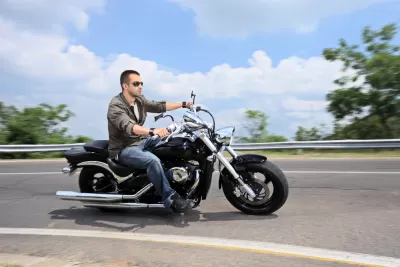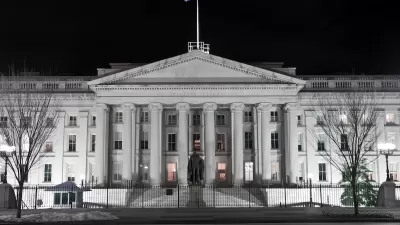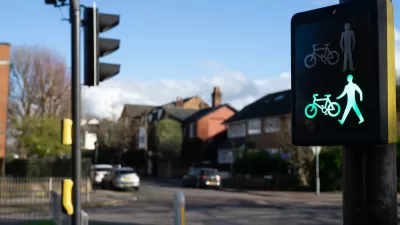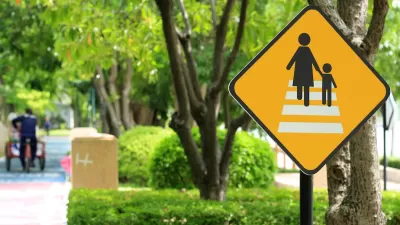Michigan's mandatory motorcycle helmet law was repealed in April 2012. It only took a week for Dr. Carlos Rodriguez to notice an increase in patients not wearing a motorcycle helmet in his trauma unit in Grand Rapids, so he launched a study.

After Michigan Governor Rick Snyder signed the repeal law on April 13, 2012, Vince Consiglio, president of American Bikers Aiming Toward Education (ABATE) of Michigan, stated:
“I want to extend our gratitude to all the legislative officials and Governor Rick Snyder, who courageously supported freedom in the face of an onslaught of baseless and emotional arguments perpetuated by our opponents.”
"In the three years after Michigan repealed a mandatory motorcycle helmet law, deaths and head injuries among bikers rose sharply, according to a recent study," writes Madeline Kennedy for Huffpost Healthy Living.
Deaths at the scene of the crash more than quadrupled, while deaths in the hospital tripled for motorcyclists. Head injuries have increased overall, and more of them are severe, the researchers report in the American Journal of Surgery.
Kennedy provides the data in the report—the percentage increase in injuries and fatalities before and after the repeal was enacted, and also among patients admitted who wore helmets and those who didn't since the repeal passed.
If you are not a motorcyclist, the report is still relevant to you.
As the study points out, the cost of injuries and deaths from motorcycle crashes is extremely high, Dr. Ben Zarzaur, a surgeon who studies motorcycle helmet laws, said, adding that taxpayers and other insurance payers often bear this cost. “So, choosing not to wear a helmet has consequences for many more people than just to the person who decided not to wear the helmet.”
Dr. Carlos Rodriguez who works in the trauma unit at Spectrum Health Hospital in Grand Rapids is hoping that the stark findings will "hopefully make legislators see that [the repeal of the mandatory helmet law] was a mistake," he said. The earlier DFP article reported on one unsuccessful attempt to pass new legislation.
Motorcyclists are required to buy additional insurance, "at least $20,000 of first party medical benefits coverage — in case they are involved in an accident," but Rodriguez states that it is rarely enforced. Even if they do, "(i)nsurer AAA Michigan said the extra insurance won’t be enough to cover motorcycle accident victims’ medical costs if they’re severely injured," noted Insurance Journal after the bill's signing.
One finding was surprising. Some have suggested that safety precautions, like helmets, may make the rider less careful, i.e., engage in more risky riding, as the riders thinks he/she is protected. In some ways this is analogous to Jevons Paradox which suggests that as appliances or motor vehicles become more energy efficient, they'll be used more frequently, thus counteracting the purpose of energy efficiency. That was not the finding in the report though.
Riders without helmets also drank more alcohol after the law was repealed, based on blood tests at hospital admission.
For bicycle comparisons, Lloyd Alter of Treehugger asks, "Does wearing a helmet encourage more dangerous riding practices? Referencing a post by Joseph Stromberg of Vox (and reposted here), the finding are either inconclusive or "there is evidence that the opposite is true, helmeted cyclists are more careful riders."
Another surprising finding—Stromberg points to a 2007 study that found that motorists passed closer to cyclists wearing helmets than those without them.
"In the U.S., 19 states and the District of Columbia require all motorcyclists to wear a helmet, while 28 states require only some to wear them and three states [Illinois, Iowa and New Hampshire] have no helmet laws at all," writes Kennedy.
Readers may recall that motorcyclists as a group saw the greatest improvement from New York City's Vision Zero program in 2015: "Deaths reduced by over 40 percent, from 37 to 22." Helmets have been a requirement in New York State since 1967.
Hat tip to Loren Spiekerman.
FULL STORY: Biker Injuries And Deaths Soar After Michigan Repeals Helmet Law

Alabama: Trump Terminates Settlements for Black Communities Harmed By Raw Sewage
Trump deemed the landmark civil rights agreement “illegal DEI and environmental justice policy.”

Study: Maui’s Plan to Convert Vacation Rentals to Long-Term Housing Could Cause Nearly $1 Billion Economic Loss
The plan would reduce visitor accommodation by 25% resulting in 1,900 jobs lost.

Planetizen Federal Action Tracker
A weekly monitor of how Trump’s orders and actions are impacting planners and planning in America.

Wind Energy on the Rise Despite Federal Policy Reversal
The Trump administration is revoking federal support for renewable energy, but demand for new projects continues unabated.

Passengers Flock to Caltrain After Electrification
The new electric trains are running faster and more reliably, leading to strong ridership growth on the Bay Area rail system.

Texas Churches Rally Behind ‘Yes in God’s Back Yard’ Legislation
Religious leaders want the state to reduce zoning regulations to streamline leasing church-owned land to housing developers.
Urban Design for Planners 1: Software Tools
This six-course series explores essential urban design concepts using open source software and equips planners with the tools they need to participate fully in the urban design process.
Planning for Universal Design
Learn the tools for implementing Universal Design in planning regulations.
Caltrans
Smith Gee Studio
Institute for Housing and Urban Development Studies (IHS)
City of Grandview
Harvard GSD Executive Education
Toledo-Lucas County Plan Commissions
Salt Lake City
NYU Wagner Graduate School of Public Service





























